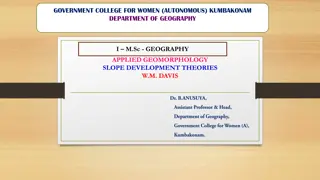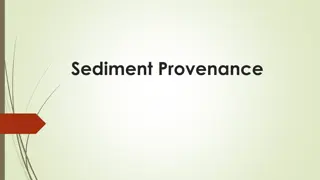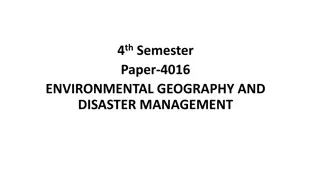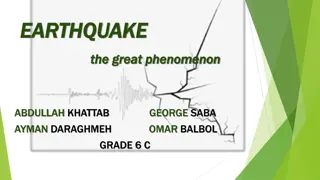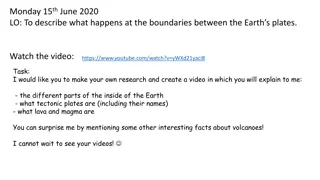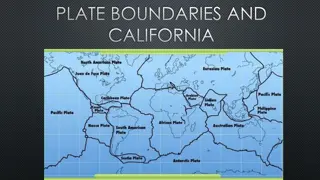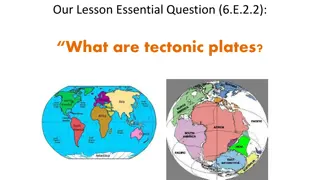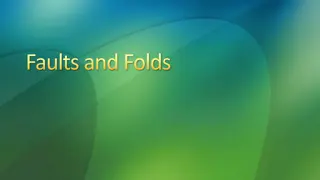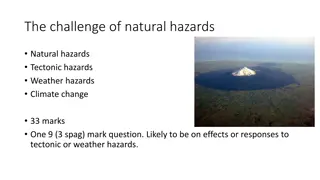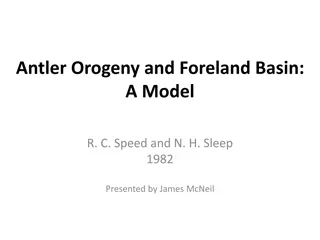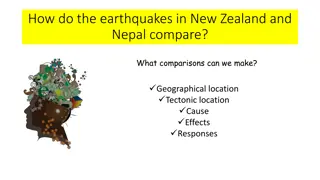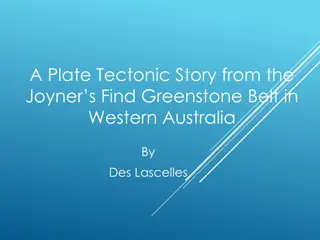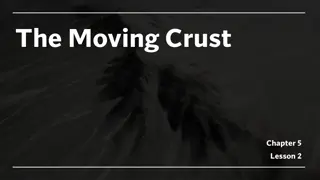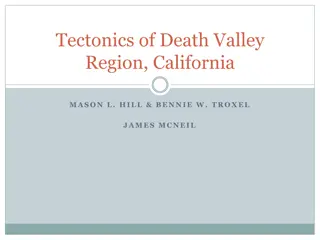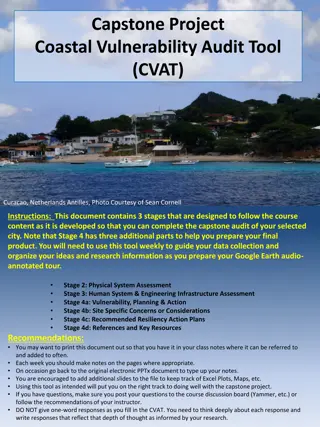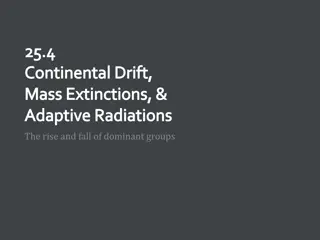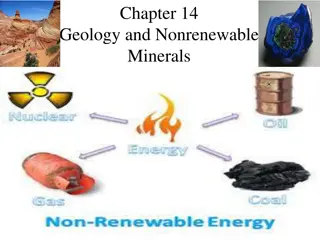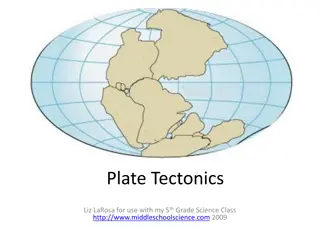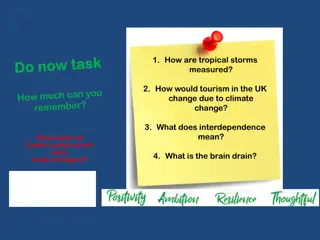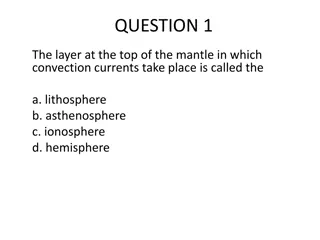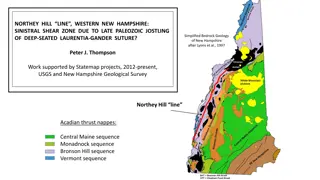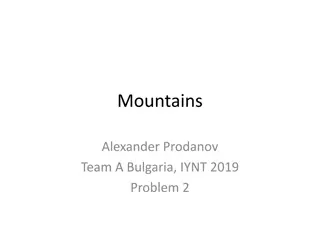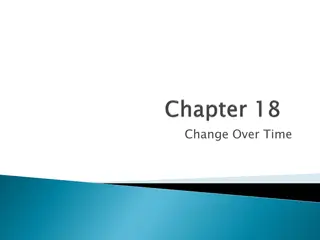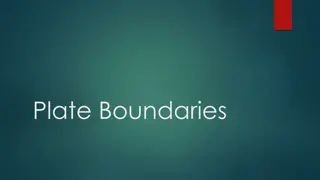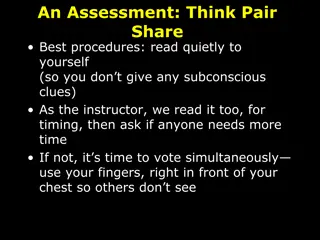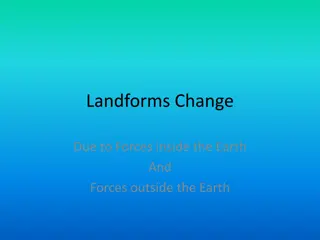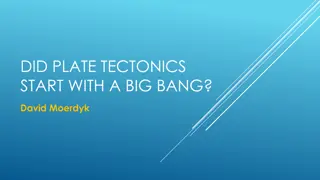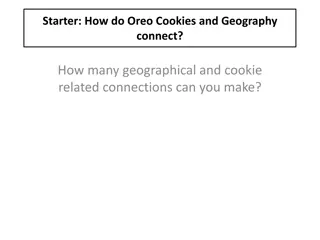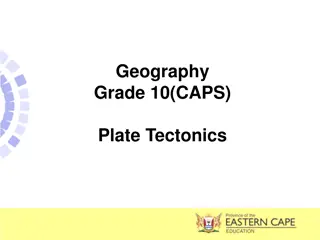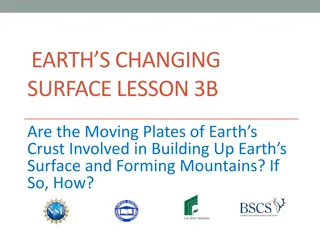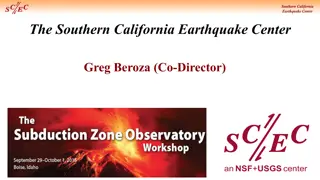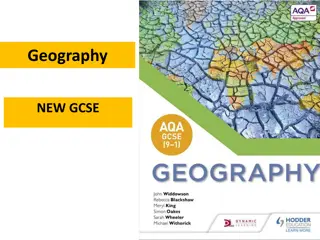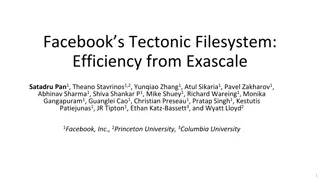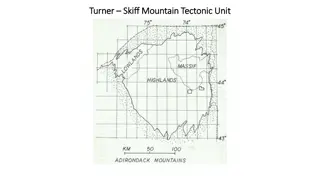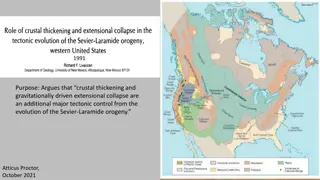Global Government Network (GGN): Paving the Way for Policy Implementation at a Department Level
The Global Government Network (GGN) aims to establish a global center of excellence for governments comparable to Davos within five years. By addressing challenges such as trust, short-termism, and international politics, GGN seeks to provide a platform for in-depth policy implementation at a depart
0 views • 11 slides
Geology of Ogun State, Nigeria: Insights and Implications
The geology of Ogun State in southwestern Nigeria, particularly within the Dahomey or Benin Basin, holds significant value for understanding the region's origins and geological evolution. This includes insights on sedimentary basins, the Wilson Cycle, and the unique characteristics of the Dahomey or
3 views • 35 slides
Understanding Plate Tectonics: Meaning, Concepts, and Plate Margins
Plate tectonics is a scientific theory explaining the movement of Earth's lithospheric plates. Developed by various scientists, it involves the drifting of plates over the Earth's surface, leading to phenomena like earthquakes and mountain formation. The theory is based on continental drift and sea-
5 views • 7 slides
Understanding Slope Development Theories in Geography - Department of Geography, Government College for Women, Kumbakonam
Slope development in geography is categorized into primary and secondary slopes, formed by processes that either promote or decrease relief. This involves erosion, weathering, and deposition processes, influenced by factors like lithology, climate, tectonic movements, and vegetation cover.
1 views • 27 slides
Understanding Sediment Provenance in Geology
Sediment provenance in geology involves reconstructing the origin of sediments through compositional analyses to determine erosion history and geographical origins. It helps characterize the journey of sediments from source to sink, providing insights into tectonic and paleoclimatic histories. Prove
2 views • 11 slides
Understanding Earthquakes: Causes and Impacts Explained
Earthquakes are natural events caused by the release of energy along faults in Earth's crust. Tectonic earthquakes, the most common type, occur due to movements of tectonic plates. Volcanic earthquakes and human-induced earthquakes also exist, each with specific triggers. Earthquakes are highly dest
0 views • 12 slides
Understanding Earthquakes: Causes, Effects, and Intensity Factors
Earthquakes are sudden shaking movements of the Earth's surface caused by various factors like tectonic plate movements, volcanic eruptions, mining, and construction. They result in ground shaking, rupture, tsunamis, and landslides, with intensity influenced by factors such as distance from the epic
0 views • 10 slides
Exploring the Forces of Nature: Volcanoes and Tectonic Plates
Embark on a journey to uncover the mysteries of the Earth's inner workings by delving into the dynamics of tectonic plates, magma, and lava. Discover the marvels of volcanoes, from their key features to the impact of volcanic eruptions on both the environment and people. Engage in creative tasks lik
0 views • 10 slides
Plate Boundaries and Geological Events in California
California is located on a plate boundary experiencing major geologic events. The state's landforms are shaped by plate tectonic activity. Understanding stress types at plate boundaries can help prevent damage and save lives. The interaction at plate boundaries plays a crucial role in shaping Earth'
0 views • 14 slides
Understanding Tectonic Plates and Earth's Layers
Explore the composition of Earth's layers through classifying them based on chemical and physical properties. Learn about the lithosphere and its role, including the movement of tectonic plates on the asthenosphere. Discover the distinctions between oceanic and continental plates, their thickness va
1 views • 22 slides
Geological Structures and Landscapes: A Detailed Overview
The illustrations and descriptions in the content depict various geological structures, including faults, folds, anticlines, and their effects on the landscape. The formation processes, such as folding, faulting, weathering, and erosion, are explained, highlighting how these natural phenomena shape
0 views • 9 slides
Understanding Natural Hazards and Their Impacts
Natural hazards, including tectonic and weather-related events, pose significant risks to humans and property. The effects and responses to tectonic hazards vary based on wealth levels in different regions. Earthquakes and volcanic eruptions result from physical processes, with patterns observed alo
1 views • 15 slides
Antler Orogeny and Foreland Basin Model Overview
The Antler Orogeny, a Late Devonian to mid-Early Mississippian event, impacted the passive margin of the North American continent, particularly in Nevada and Idaho. The orogeny involved displacement of oceanic strata, subsidence of a foreland basin, and maintenance of highlands in the interior regio
1 views • 14 slides
A Comparison of Earthquakes in Nepal and New Zealand
The earthquakes in Nepal and New Zealand differ in geographical location and tectonic setting. Nepal, near the Himalayas, experiences destructive collisions between the Eurasian and Indo-Australian plates, while New Zealand, an MEDC, is on a conservative plate margin with the Pacific and Philippine
0 views • 5 slides
The Plate Tectonic Story of Joyner's Find Greenstone Belt in Western Australia
The Joyner's Find Greenstone Belt in Western Australia lies near the Yilgarn Craton and offers insights into early Archean history through its geological mapping and stratigraphy. This small greenstone belt features mafic volcanic rocks, banded iron formations, and siliciclastic sediments, forming a
0 views • 21 slides
Plate Tectonics: Evolution of the Earth
Explore the dynamic process of plate tectonics shaping the Earth's crust through the movement of tectonic plates, subduction zones, divergent and convergent boundaries. Discover how seafloor spreading creates new oceanic crust, and learn about the geological features formed by these processes.
0 views • 25 slides
Exploring Earth's Dynamic Forces - Chapter 5 Highlights
Learn about tectonic plates, faults, earthquakes, tsunamis, seismic waves, seismographs, volcanic activity, and more in this engaging chapter. Discover how the movement of Earth's crust gives rise to mountains, earthquakes, and other geological phenomena.
0 views • 20 slides
Tectonics of Death Valley Region, California: A Geological Study
This study delves into the intricate tectonic processes of the Death Valley region in California, focusing on strike-slip and dip-slip fault systems, tensional and compressional stress, and the implications of NE-SW horizontal shortening and NW-SE relative extension. It explores the unique features
0 views • 10 slides
Coastal Vulnerability Audit Tool (CVAT) for Curacao, Netherlands Antilles
This document outlines the stages of the Coastal Vulnerability Audit Tool (CVAT) for assessing the physical system and human system & engineering infrastructure of Curacao, Netherlands Antilles. It covers key aspects such as coastal setting, climatic and tectonic settings, topographic profile, coast
0 views • 10 slides
The Impact of Continental Drift on Earth's Biogeography
Continental drift, caused by the movement of tectonic plates, has had profound effects on Earth's habitats and the distribution of organisms. From the formation of supercontinents to the separation of land masses, these geological processes have led to climate change, speciation events, mass extinct
0 views • 17 slides
Earth's Geological Processes and Environmental Impact of Mining
Earth's geological processes involve the formation and movement of tectonic plates, creating divergent and convergent boundaries, leading to events like earthquakes and volcanic eruptions. Gold mining, a process that extracts small amounts of gold from large quantities of rock using cyanide leaching
0 views • 51 slides
Exploring Plate Tectonics and Earth's Structure for 5th Grade Science
Delve into the world of plate tectonics with a focus on Earth's layers, crust, mantle, and core. Understand how tectonic plates move and learn about continental drift and the concept of Pangea. Explore evidence of Pangea, sea floor spreading, and the fascinating geological processes that shape our p
0 views • 23 slides
Understanding Tectonic Hazards and Geothermal Energy
Exploring the impact of tectonic hazards on population distribution and farming, as well as the use of geothermal energy as a renewable power source. From measuring tropical storms to the concept of interdependence, this informative content covers a range of topics related to natural phenomena and h
0 views • 14 slides
Earth Science Quiz: Tectonic Plates, Mountains, and More!
Explore your knowledge of Earth's geology with this quiz covering topics like tectonic plate boundaries, famous geologists, mountain ranges, and geological processes. Test your understanding of concepts like convection currents, subduction, continental drift, and more in this engaging quiz.
0 views • 65 slides
Explore Mont Blanc: A Majestic Fold Mountain in the Alps
Mont Blanc, the 11th highest peak globally, is a stunning fold mountain on the France-Italy border formed by tectonic plates over millions of years. Discover its shrinking size, record cold temperatures, and historic significance such as hosting the first winter Olympics.
0 views • 6 slides
Bedrock Geology of Western New Hampshire: Northey Hill Line and Geological Features
The Northey Hill Line in Western New Hampshire is a sinistral shear zone resulting from Late Paleozoic tectonic activities. The area showcases a complex geological history with Acadian thrust nappes, Oliverian domes, and Mesozoic faults, providing insights into the region's structural evolution. Thi
0 views • 34 slides
Analyzing Tallest Mountains in the Solar System
This document explores the tallest mountains in the Solar System and proposes theoretical models for predicting their maximum altitudes on various celestial bodies. It discusses the heights of mountains on Mercury, Earth, Moon, Mars, Vesta, Ceres, Io, and other celestial bodies, along with different
0 views • 29 slides
The Theory of Plate Tectonics: Continents in Motion
Earth's crust and lithosphere have changed over geologic time, forming tectonic plates that move due to convection currents. The concept of plate tectonics explains how continents fit together, the existence of a supercontinent called Pangaea, and natural phenomena like earthquakes and mountains. Ea
0 views • 28 slides
Exploring Plate Boundaries: Convergent, Divergent, and Transform Faulting
Delve into the world of plate boundaries by understanding convergent, divergent, and transform faulting. Discover various examples worldwide, describing their physical locations, major tectonic plates involved, resulting landforms, lithosphere types, and associated catastrophic events. Learn about t
0 views • 5 slides
Plate Tectonics and Boundaries Overview
The content discusses various aspects of plate tectonics and boundaries, including the best procedures for assessments, features at convergent and divergent boundaries, the movements of ocean plates relative to islands, identifying plate boundaries on a map, and reasons for the delay in accepting pl
0 views • 7 slides
Forces Shaping Landforms: Inside and Outside the Earth
Explore how landforms change due to forces inside the Earth, like plate boundary activity forming fold mountains, and forces outside the Earth, such as the creation of oceanic trenches. Discover the formation of fold mountains like the Alps and Rockies, as well as deep oceanic trenches like the Mari
0 views • 10 slides
Unraveling Plate Tectonics: Impact of Earth's Geological Formations
Exploring the intricate relationship between plate tectonics and significant geological events such as Permian-Triassic extinctions, lava eruptions, and bolide impacts. Delve into the origins of Earth's tectonic movements and their profound impact on the planet's history.
0 views • 28 slides
Exploring the Connection Between Plate Tectonics and Oreo Cookies
Discover the unique ties between plate tectonics and Oreo cookies through a creative exploration of tectonic plate boundaries using Oreo cookies as a tangible model. Learn about the structure of the Earth, types of plate boundaries, and the movement of tectonic plates in a hands-on and engaging mann
0 views • 15 slides
Understanding Plate Tectonics and Earth's Surface Features
The study of plate tectonics reveals how the Earth's crust is divided into tectonic plates, leading to various types of plate boundaries like divergent, convergent, and transform. These movements result in earthquakes, volcanic eruptions, and landform changes such as folding and faulting. Different
0 views • 15 slides
Understanding Earth's Changing Surface: The Role of Moving Tectonic Plates in Mountain Formation
Earth's changing surface involves the movement of tectonic plates, which play a crucial role in building up the Earth's surface and forming mountains. Through investigations and models, we explore how these plates move and interact to shape our planet's features.
0 views • 20 slides
Southern California Earthquake Center Overview
The Southern California Earthquake Center (SCEC) is a large consortium of institutions dedicated to coordinating earthquake research in Southern California. Their mission involves communicating earthquake understanding to reduce risk and improve community resilience, integrating information for a co
0 views • 22 slides
Discover the Fascinating World of Geography - GCSE Overview
Explore the diverse field of Geography through this GCSE overview. Delve into Physical Geography encompassing natural elements like climate and landforms, and Human Geography focusing on human interactions with the planet. Uncover the unique blend of transferable skills such as communication, teamwo
0 views • 30 slides
Efficiency of Facebook’s Tectonic Filesystem for Exabyte-Scale Storage
Facebook's Tectonic Filesystem improves efficiency for exascale storage, addressing challenges in data warehouse, blob storage, and operational complexity. By offering a generic solution scalable to exabyte-scale clusters, Tectonic simplifies operations, enhances resource utilization, and supports m
0 views • 14 slides
Exploration of Turner Turner Skiff Mountain Tectonic Unit
Detailed documentation of Turner Turner Skiff Mountain Tectonic Unit, including images, fieldwork descriptions, rock types, and isotopic analyses. The unit showcases layered granite gneisses, magnetite ore bodies, retrograde metamorphism, metagabbro sills, and leucosome formations near Arnold Pond.
0 views • 25 slides
Tectonic Controls of the Sevier-Laramide Orogeny
The Sevier-Laramide orogeny was influenced by crustal thickening and gravitational extensional collapse. The tectonic model proposed suggests that conductive heating from subduction weakened the crust, leading to compression, uplift, and lateral growth. Deformation persisted from the Cretaceous to t
0 views • 8 slides



